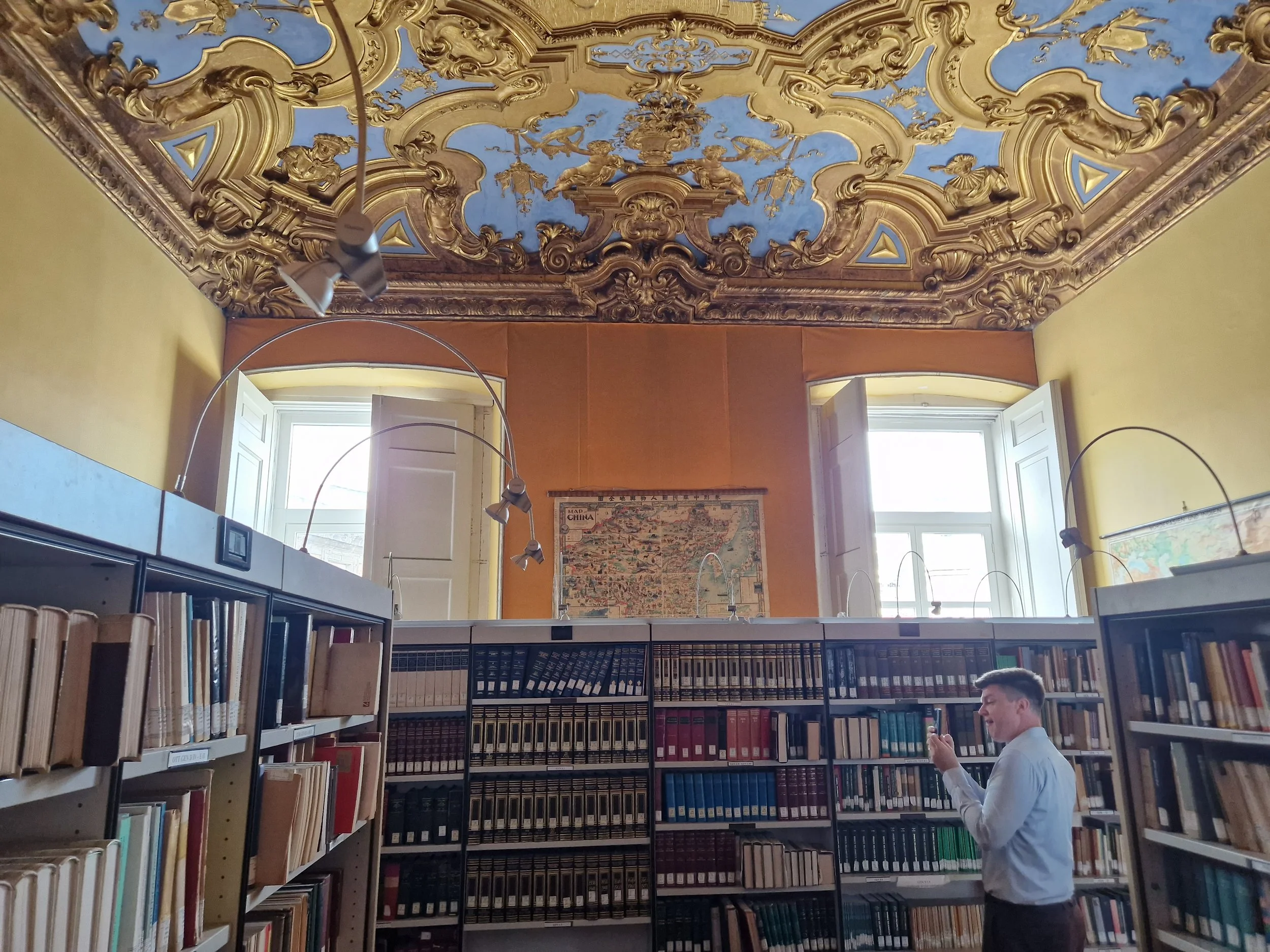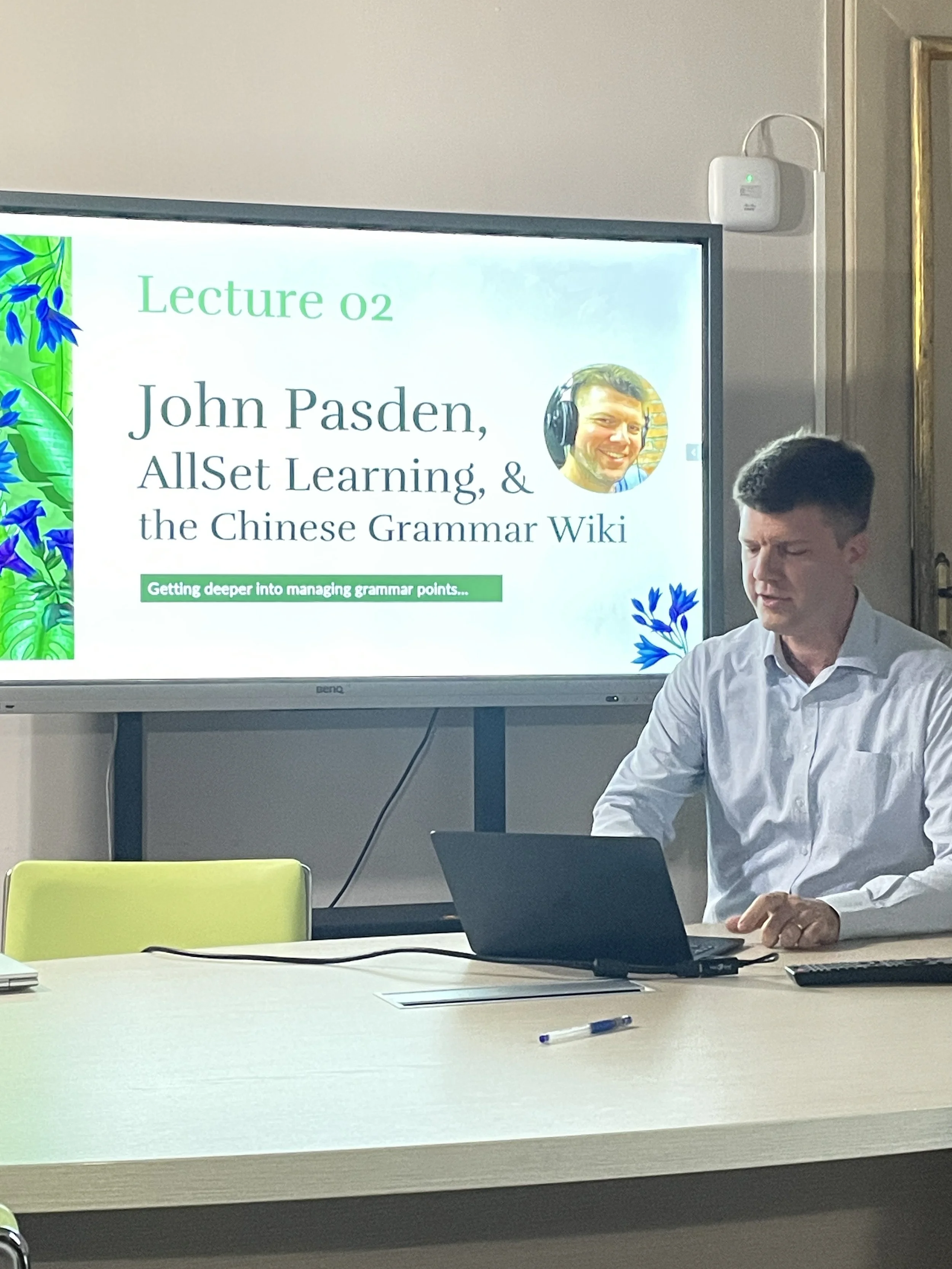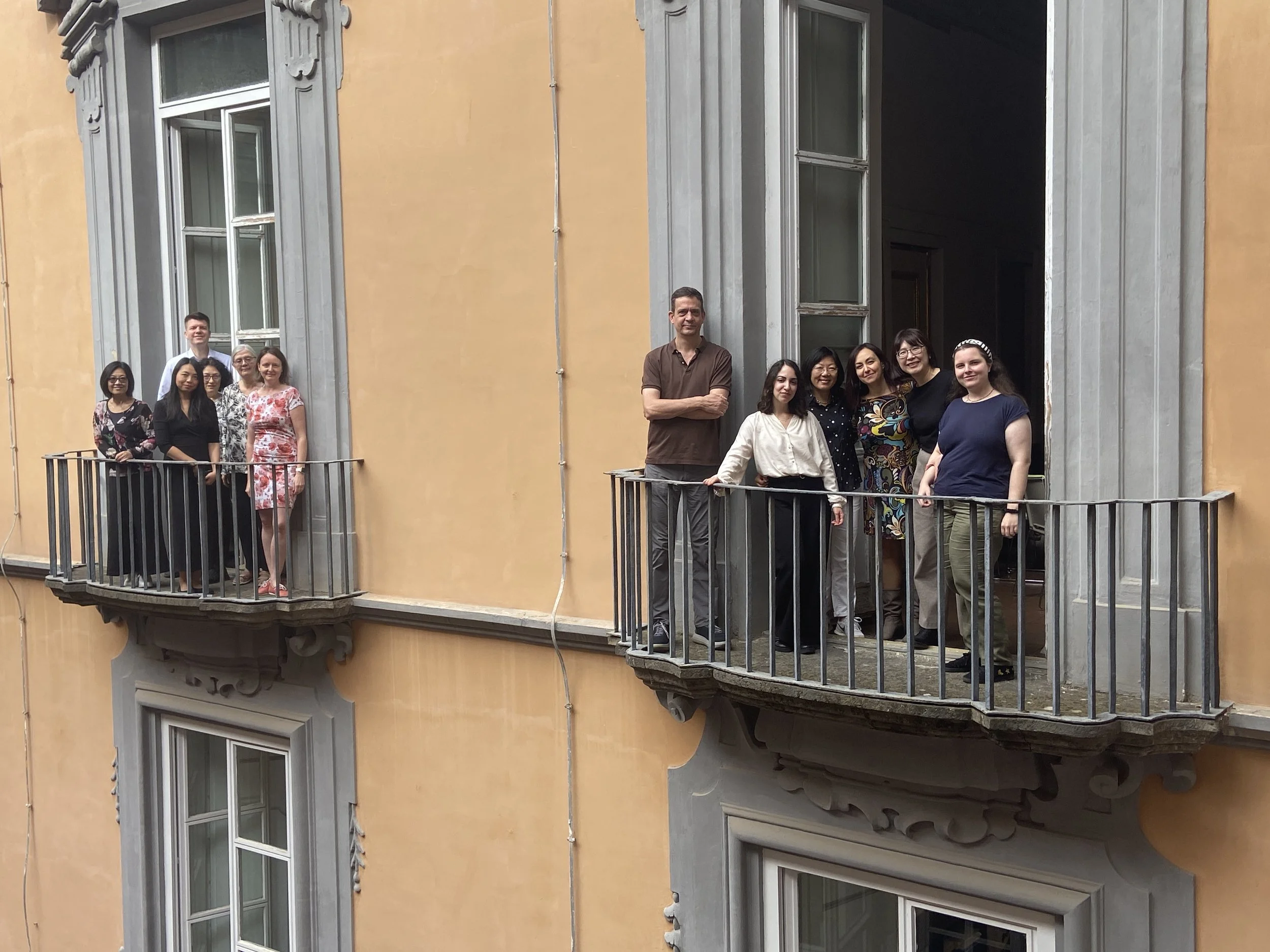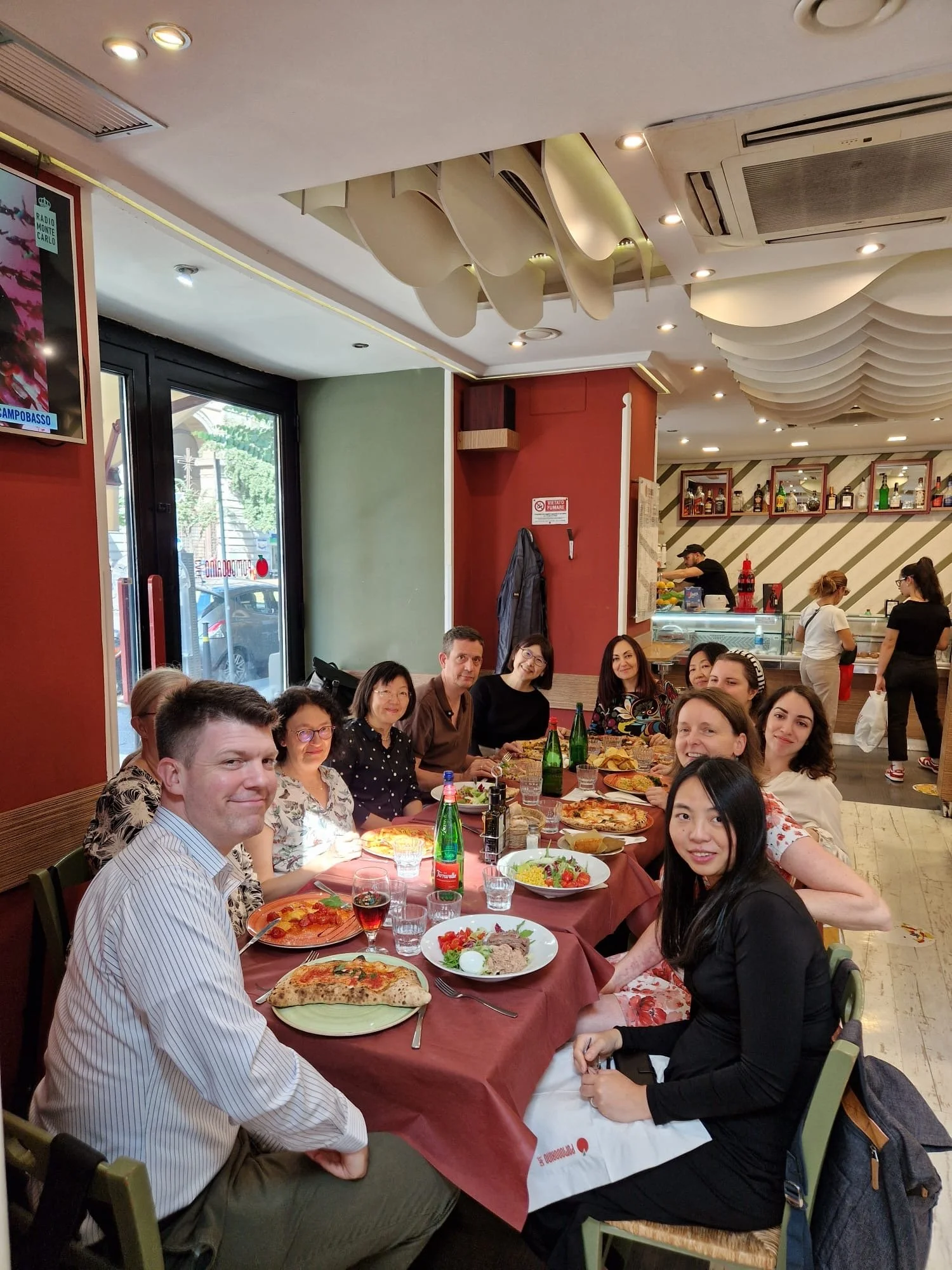From Shanghai to Naples: AllSet Learning’s Role in the Global 'Chingram' Project
A group of European Chinese professors are creating a new online resource for European beginners of Chinese called Chingram. What makes this resources special is that it will not use English as the language of instruction, but will instead use Czech, Polish, Danish, Italian, and German. These languages receive relatively little direct attention in the world of Mandarin Chinese learning resources.
Diving into their ambitious project in 2024, these academics have also invited John Pasden to share his experiences creating and developing the Chinese Grammar Wiki over the years. Below is John’s account of his trip to Naples, Italy in October 2024.
It all started with an email…
This collaboration began when Dr. Michaela Zahradnikova of the Chingram team reached out to me in early 2022, inquiring about using parts of the Chinese Grammar Wiki in a new project. Understanding their mission to provide a non-commercial, multilingual Chinese grammar resource for European students, I agreed, seeing it as a natural extension of AllSet Learning's dedication to expanding quality Chinese education resources. Over time, the project continued to grow and expand, and they invited me to Naples in late 2023 to offer guidance on key structural and pedagogical aspects of grammar design.
During my recent visit to Naples to meet with the Chingram team, I was pleased to see the extent to which the Chinese Grammar Wiki has become a trusted resource for Chinese language learners worldwide. The academics were particularly impressed by the Wiki's comprehensive approach to grammar and the accessible, user-friendly layout that makes it easy for students to understand complex linguistic concepts. I was honored to hear that their students, many of whom speak Danish, Czech, Polish, Italian, and German, regularly rely on the Wiki as a go-to source for their Chinese studies.
Our discussions focused on organizing grammar points, managing the depth and breadth of explanations, and standardizing example sentences. These are essential elements in ensuring the platform remains both comprehensive and accessible. Each topic touched on the principles of content management and clarity that have guided the Chinese Grammar Wiki from its inception, and it was exciting to share those strategies with an enthusiastic and motivated team of linguists and educators.
The Chingram team includes:
Michaela Zahradnikova, PALACKY UNIVERSITY, OLOMOUC, CZECH REPUBLIC
Yixuan Jandová Chen, PALACKY UNIVERSITY, OLOMOUC, CZECH REPUBLIC
Chun Zhang, AARHUS UNIVERSITY, AARHUS, DENMARK
Lene Sønderby Bech, AARHUS UNIVERSITY, AARHUS, DENMARK
Henning Klöter, HUMBOLDT UNIVERSITY, BERLIN, GERMANY
Chin-hui Lin, HUMBOLDT UNIVERSITY, BERLIN, GERMANY
Wisława Szkudlarczyk-Brkić, ADAMA MICKIEWICZ UNIVERSITY, POZNAN, POLAND
Halina Wasilewska, ADAMA MICKIEWICZ UNIVERSITY, POZNAN, POLAND
Zuzanna Wnuk, ADAMA MICKIEWICZ UNIVERSITY, POZNAN, POLAND
Luisa M. Paternicò, L’ORIENTALE UNIVERSITY OF NAPLES, ITALY
Yao Qiong, L’ORIENTALE UNIVERSITY OF NAPLES, ITALY
Bridge Between Languages and Cultures
Working with the Chingram team, I experienced a unique challenge through the other academics: localizing Chinese grammar explanations for five very different languages. Although I don’t speak Danish, Czech, Polish, or German, and only a tiny bit of Italian, I was able to provide support on the broader design of their platform. The team’s commitment to making high-quality resources accessible in each language was inspiring, and we discussed various ways to adapt explanations and resources to each linguistic background’s unique needs. Through these discussions, it was clear that localization would sometimes require more than simple translation, as different languages can call for distinct ways of explaining Chinese concepts.
John takes photos of some rare books in the extravagantly decorated university library.
It was impressive to witness firsthand the commitment from each of the Chingram team members to create resources tailored specifically for their languages. They are all dedicated to high standards of accuracy and the needs of their respective students, and I was glad to offer insights where I could. Together, we worked on identifying points where the structure of explanations could flexibly accommodate cultural and linguistic differences without losing the rigor of the original content. This exchange highlighted AllSet Learning's role not only as a content creator but as a supporter of broader cultural and linguistic exchange.
I look forward to maintaining this collaborative relationship and potentially offering further support as Chingram grows. Seeing so many dedicated professionals rally around the shared goal of teaching Chinese across languages was a great demonstration of how language learning can bridge diverse cultures. Never had it felt more real, to me personally!
Experience Sharing
John presents to the Chingram team about developing the Chinese Grammar Wiki.
One of the core aspects of my visit involved sharing the experience and lessons learned from managing an extensive online language resource. With the Chingram team, I emphasized the importance of simplicity and user-friendliness, both in content and platform design. Managing a large team tasked with producing a cohesive, well-organized resource can be challenging, so I shared strategies that had been particularly effective for the Chinese Grammar Wiki. We discussed ways to use the platform itself to streamline workflows, ensuring that contributors could easily collaborate while maintaining consistency in content.
Another key piece of advice I shared was the value of building a resource that evolves organically through engagement with learners and feedback from users. This idea of an adaptable resource was somewhat novel for the Chingram team, as many of them come from academic and research backgrounds, where structures tend to be more fixed. I encouraged them to prioritize open-ended growth, seeing the platform as something that could continually respond to user needs and linguistic trends.
As we delved into various aspects of resource management, I also recommended free and open-source software (FOSS) solutions that could simplify and support their work. The Chingram team seemed receptive to these ideas, and it was rewarding to provide insights that I hope will help their project thrive. Seeing this level of mentorship and knowledge-sharing felt deeply rewarding, as it aligned with AllSet Learning’s mission of nurturing collaborative, innovative approaches to Chinese education.
Expanding Chinese Learning Beyond English-Speaking Audiences
One of the aspects I find most fulfilling about supporting Chingram is the opportunity to reach non-English-speaking learners of Chinese. At AllSet Learning, we’ve always believed in the power of language as a bridge to cross-cultural communication, particularly between China and other parts of the world. By helping create resources for European students from diverse linguistic backgrounds, we’re contributing to a vision where Chinese learning isn’t limited to English-speaking audiences—a goal we all share.
John and the Chingram team stand on the balconies of L’Orientale University of Naples, Italy.
The Chingram team faced unique challenges in adapting Chinese language resources for speakers of Danish, Czech, Polish, Italian, and German. Each language has its own linguistic peculiarities, which sometimes requires creative solutions that go beyond standard translations. This point in particular helped drive home a conclusion for me that the Chingram team had already come to: no language-learning rsource dedicated to native speakers of a particular language could simply translate a resource meant for native speakers of English. It would have to be adapted, in ways big and small. This was equally true for Czech Polish, Danish, Italian, and German, but the implementation details differed for each. I did not envy the team these challenges!
The Future of Chinese Grammar Wiki and AllSet Learning Projects
Looking ahead, the Chinese Grammar Wiki is expanding with new projects, including significant additions to the Chinese Vocabulary Wiki. This upcoming project will introduce more content that caters to both learners and academics, creating new avenues for students to deepen their understanding of Chinese vocabulary and linguistics. Experiences like the one with Chingram continuously inspire new ideas for the Wiki, and I am excited to see how these developments will impact learners globally.
This collaboration reminded me of the importance of ongoing innovation and adaptability in language education. Seeing Chingram’s commitment to quality and inclusivity motivated me to continue pushing the boundaries of what AllSet Learning offers. By staying at the forefront of language learning technology and pedagogy, AllSet Learning aims to be a resource not only for students but also for educators and researchers who want to bring Chinese to new audiences.
In the future, we’re committed to maintaining the Chinese Grammar Wiki as a leading resource in Chinese education, while also exploring new projects and collaborations. With a growing network of educators and learners, I am excited to continue evolving and helping to contribute to resources for a diverse, global audience.
(I am also still trying to work off the weight I gained in Italy! What a trip!)
You better believe some delicious Italian food was shared in Italy! (Chinese food too, but that was a little less exciting for Joihn, since he lives in Shanghai.)
A huge grazie (谢谢) to the entire Chingram team for their hospitality and infectious passion. I truly hope I will see them again soon.




